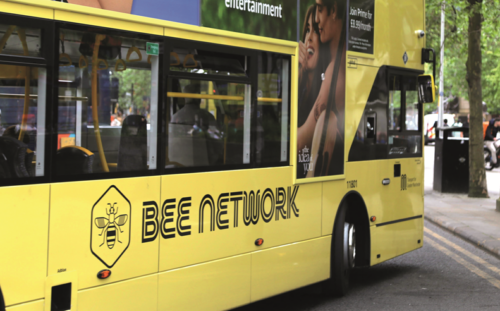
Bee Network punctuality is not as good as it could be, one local newspaper reveals, and removing some stops could help
Local newspaper the Bolton News reports that on services franchised as part of the first tranche of contract awards in Bolton, Wigan, and parts of Bury and Salford, buses only met their punctuality targets on 32 out of 105 days, according to its analysis of the data, which Transport for Greater Manchester has published since January.
The newspaper’s analysis found that although punctuality appears to be trending upwards, half of the days where the network managed to meet its target were during the school Easter holidays, whilst weekends and Mondays were overall the most punctual. The network failed to meet punctuality targets consistently on Tuesdays and Fridays except during the Easter holidays.
Head of Data at Open Innovations in Leeds Tom Forth told the newspaper: “You can take out bus stops. In Britain, we’ve got an unusually high number of bus stops. People like that because they think ‘ah well, the bus stops near to my house, so that’s what I want.’ But, the thing is – once you’re on the bus, so the bus can stop near to everyone’s house, it stops 28 times.”
He found that between Bolton Interchange and Manchester’s Shudehill there could be as many as 57 stops and a journey time of more than an hour. “That’s not normal,” he said. “We think that’s normal in Britain, but if you were to do that same journey in other countries, it would be far fewer stops – it would be half as many.”
Tom highlighted a similar project in Birmingham that he was involved in and which led to the removal of 60 stops. Although it was controversial, he said the change resulted in increased passenger numbers. He compared Bolton town centre, where he says there are more than 2,000 bus stops within an 5 mile radius, compared to under 1,000 in the same radius of the Dutch city of Utrecht.He also suggested that increasing the number of bus lanes, ticket simplification, and the addition of centre doors would all also help to reduce delays and increase punctuality. “Once they’re able to roll out proper tap-on technology, [there should be] a really big improvement in how fast the buses can go, just because they’ll be waiting at stops for much less time.
“At some times you can be looking at 30% of the whole of the buses’ time sat at stops, negotiating to get people on to the bus. We know that when a bus stops in Leeds city centre it often takes five minutes just to get full of people.”
A Transport for Greater Manchester spokesperson responded: “‘Punctuality figures can be affected by the overall performance of the highway network, including a range of factors such as the presence of roadworks, weather conditions and changes such as school holidays.
“Whilst other innovations such as ticketing technologies and, in particular, the use of central doors on vehicles can speed up journey times, this needs to be balanced with the investment required and, in terms of the latter, can only be delivered if the whole of the area’s stop infrastructure is amended also.
“TfGM remains committed to maximising accessibility to the network and – whilst reviewing stop siting is always beneficial – ensuring the maximum number of passengers can easily access the network in terms of distance to a stop remains a critical outcome.”
Bolton West MP Chris Green said he was against the suggestion to reduce the number of stops: “The most important thing is that are most people able to access bus services or is the Holy Grail of the service just punctuality? And my concern is that people might have the services they depend on cut so that the powers that be can say that they are delivering a better quality service.”

